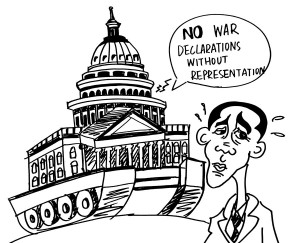Congress must speak up on its war powers
For Congress, it is rare for the mere act of voting to become more significant than the outcome of that vote. If the United States is to take significant military action against the Islamic State, they must do so with authorization from Congress. To allow anything else, including the unbridled and open-ended conflict that President Obama outlined in a speech to the nation on Wednesday night, sets a dangerous and unconstitutional precedent very far from the ideals upon which our nation was founded.
Obama announced air strikes in Syria and a more comprehensive bombing campaign in Iraq in an effort to “degrade and ultimately destroy” the movement that has taken over most of southern Syria and northern Iraq, and resulted in the beheading of two American journalists in the last month. Obama and White House officials have claimed that the new bombing campaign in Syria is constitutional and requires no Congressional approval, because of the 2001 Authorization for Use of Military Force (AUMF). That’s right: A session of Congress 13 years ago authorized military action today against a movement they didn’t even know existed.
How strange does that sound?
The history of war powers is complex. When Congress passed the War Powers Resolution in 1973, they did not intend to end executive war powers, but rather to require Congressional approval after a certain time — 60 days. Clinton questionably violated the act in 1999 with the Bosnia invasion, but post-9/11, a new era of executive action was born. Congress passed the 2001 AUMF, which the Supreme Court has validated as giving broad powers to the executive to wage war outside of Congress. The AUMF, however, specifically gives the executive the authority to use force against those who “planned, authorized, committed, or aided the terrorist attacks that occurred on September 11, 2001, or harbored such organizations or persons.”
It’s a slippery slope. The Islamic State’s leaders have broken from Al Qaeda in Pakistan, and little (if any) evidence has been shown to link them to the perpetrators of the 9/11 attacks. The Obama administration’s reasoning on ISIS sounds a lot like the Bush administration’s reasoning in the 2003 pre-Iraq invasion. There is a lot of talk, and little evidence. Déjà vu?
It’s time for all of that to end. Congress showed signs of life when it took a stand on Obama’s request to use force in Libya in 2011 by voting to cut funding for the operation, but that will be for naught if representatives remain silent on action in the Middle East, which has no timetable to describe the length of the mission. In fact, operations in Iraq since the ISIS invasion have already exceeded the 60-day limit.
Whether you are a Republican or a Democrat, imperialist or isolationist, one thing that it is important to agree on is the need for Congress to, at the bare minimum, have a voice in this matter. This voice cannot be the one Obama has asked them to have — authorizing $500 million to train pro-western rebels in Syria — but a voice that either authorizes or rejects the entire mission in the first place.
Such a vote likely won’t come, but the conversation shouldn’t stop. In the next Congress, a serious look at repealing the 2001 AUMF is necessary. As we pass the 13th anniversary of 9/11, we should no longer rely on 14-year-old military authorizations to confront our enemies.
An executive unhampered by Congress could do far more damage in the coming century than the radical Islamic network of the year. Worse yet, for all his violations of the War Powers Act (which the AUMF cannot supersede), Obama’s leadership is the least of our problems — but an imperialist, militaristic president that the nation elects in the future might be.
“The AUMF is now nearly 12 years old,” said Obama at the National Defense University in May 2013. “Unless we discipline our thinking, our definitions, our actions, we may be drawn into more wars we don’t need to fight, or continue to grant presidents unbound powers more suited for traditional armed conflicts between nation states.”
That wasn’t a Congressman, a general or even a civilian speaking. That was President Obama one year ago. And if Obama — who has overseen a massive drone program and the reintroduction of force into Iraq — is worried about a future executive abusing the power, maybe we should be, too.
Nathaniel Haas is a junior majoring in political science and economics. His column, “State of the Union,” runs Fridays.



Even when Obama tries to muster all his strength and courage – when it comes to military action – you can tell he is scared and un-sure of himself. It is too bad he started his Presidency with an Apology Tour and tried to make friends with the very people he is claiming he will kill today. Obama does not have any idea how to lead in foreign afairs – he just wants to be the guy the entire world loves and he wants to be the “Anti-George Bush”. Unfortunately for him – he is discovering that when you assume the responsibilities of the President – you can not just try and be the cool guy everyone loves – you actually have to make adult decisions and it is not all pixie dust and good vibes…
I am still trying to understand how exactly ISIS is a threat to the USA. ISIS is in the middle of an attempt to recreate the Ottoman Empire, the Persian Empire, the Roman Empire, the Egyptian Empire or something like that. This region has been in constant conflict since the beginning of recorded history. Sending US forces or weapons or money to the region is a waste of tax dollars.